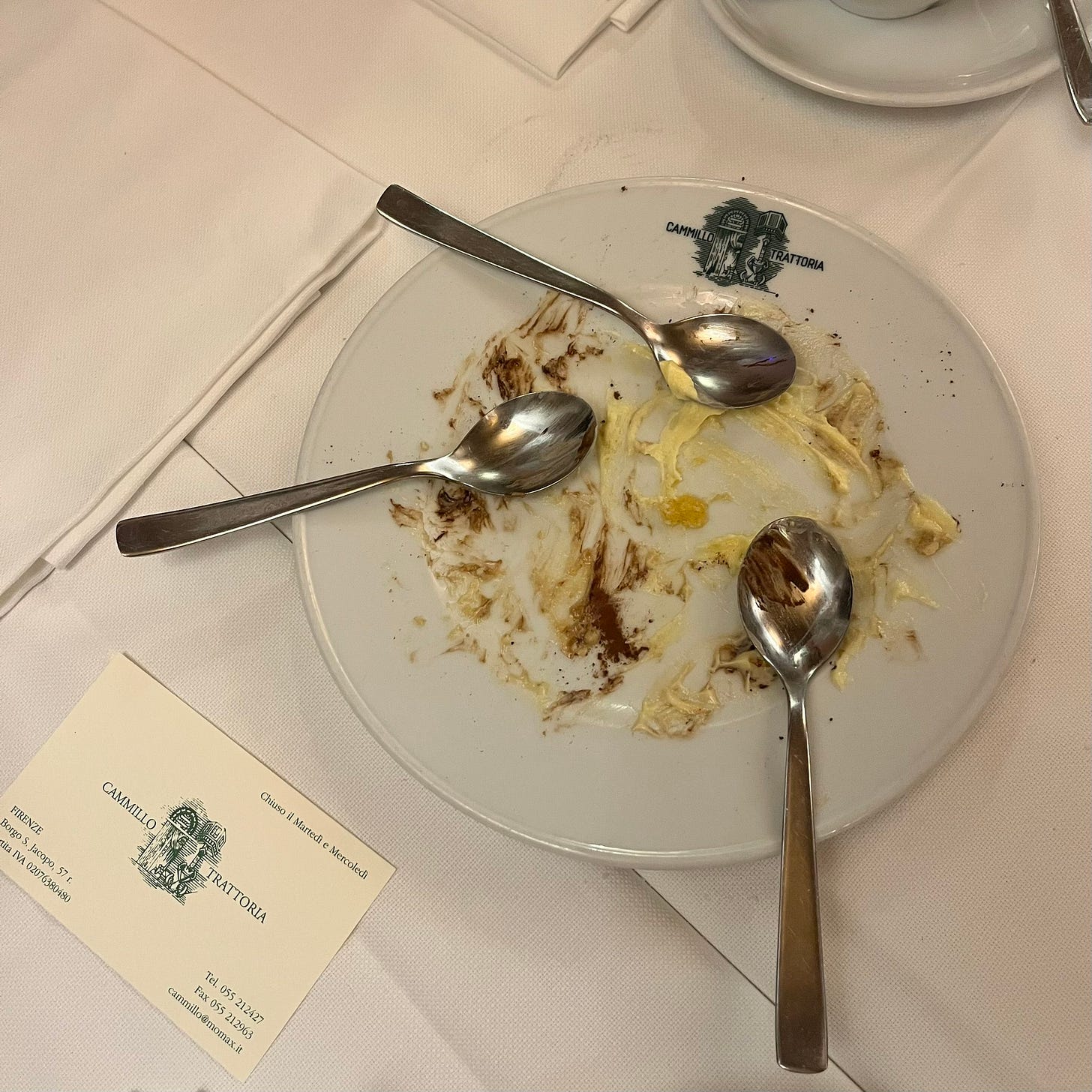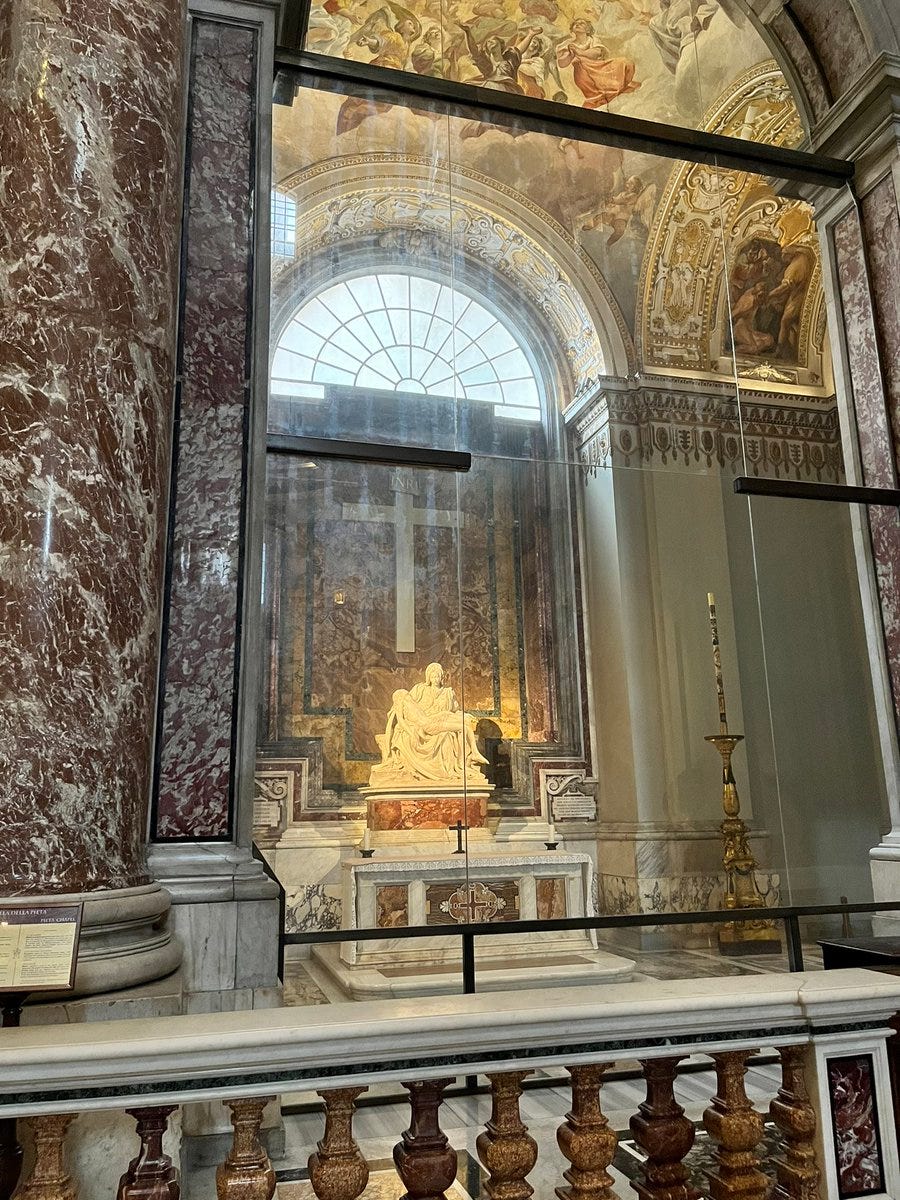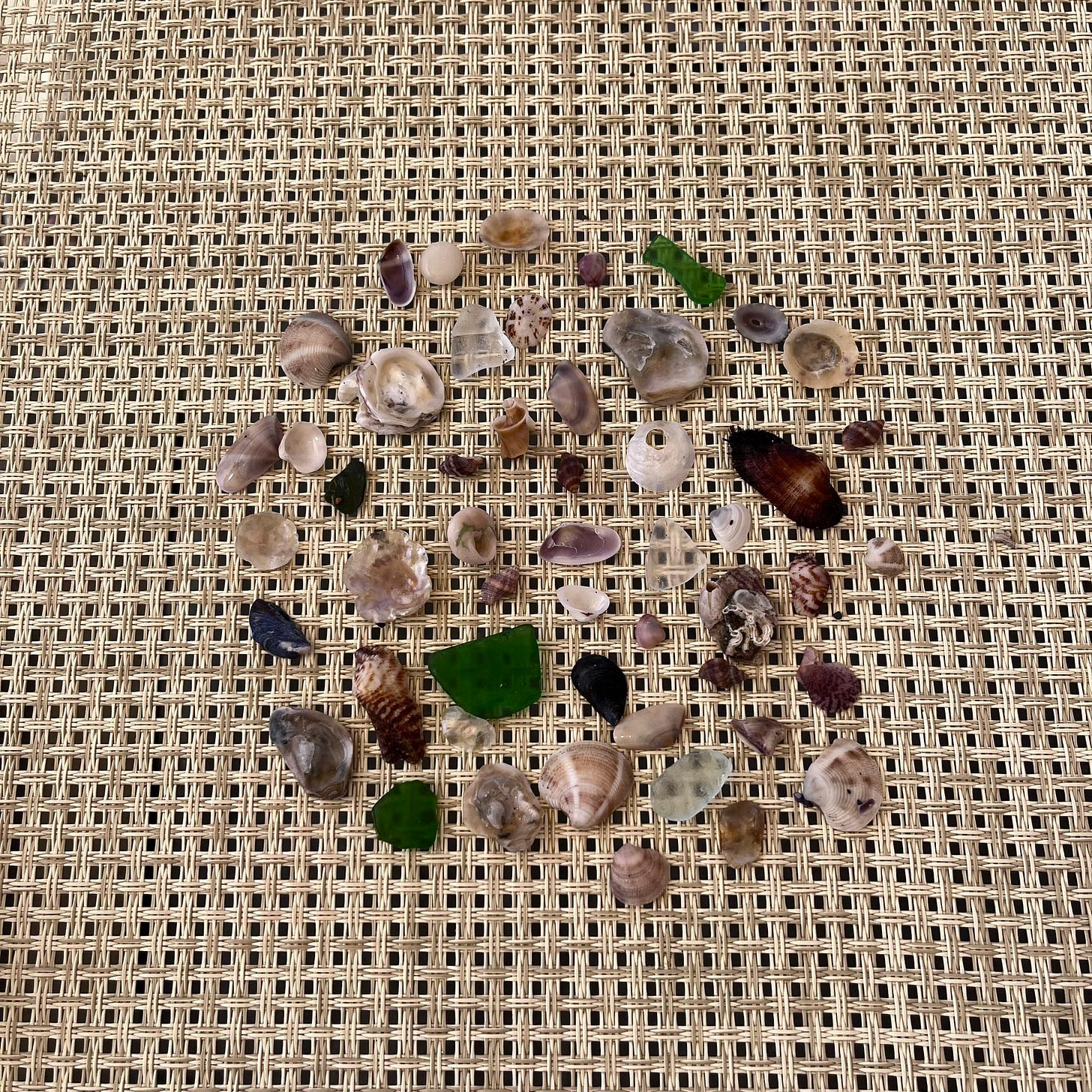It is Tuesday afternoon, it is raining in Rome, where I am writing to you from. By the time I will find the time to edit this, I suppose a week will pass and I will be in a small seaside town. I haven’t written anything in a while, I fail even within the privacy of my diary - which now only consists of brief notes such as “Failed at writing an entire sentence in cursive Russian” or “Sat inside the Sistine Chapel after five cups of coffee and definitely felt something”. All my reflections enclose unconsolidated endings, like a candle burning from both flanks. In the shower this morning I pondered how I would remember this summer, or even this entire year with time, the next years and decades. Every season brings a tangible ensemble. For a few months now I have been almost solely listening to Gould’s recording of the Goldberg Variations, Abbado’s Mahler, and Bernstein’s Schubert. I have been mourning a lost friendship, this grief seems most defining now. Every morning when I sprinkle rose water on my face I think of what is lost. Something so pearly transcendent and extraordinary. In some form, every recollection this summer regards totalization. Before leaving Berlin I printed out a few jstor articles on Derrida and read them on the way to Florence. In his work, Derrida quotes Hamlet “The time is out of joint”.
When I first heard the term hauntology I was in an afternoon Zoom class on the Sefer Yetzirah (a book on Jewish mysticism, although some preferably treated it as a treatise on mathematical and linguistic theory as opposed to Kabbalah) it was that very seminar that made me sign up for religious studies. I thought the term sounded stunning and not tonal in politics at all. I still believe hauntology is quite the intimate, emotional phantom. I once read this line, “When it comes down to it everything is about ghosts except ghosts, which are about love”. The idea of course is that the present lives only with the past, embedded. Thus, it is closely related to the notion of deconstruction and points out that what we see is not what is, but is the consequence of the dissimilarity of invisible elements. According to the logic of hauntology, the past is always present in the now, but not in its initial form, but in the physique of a fraction. Mark Fisher brushed upon hauntology too, claiming that what is significant about the figure of the specter, is that it cannot be thoroughly present: "It has no being in itself but marks a relation to what is no longer or not yet" (Stanford University Press, 2008, 82).
I’ve just finished Dinner with Lenny (the last extended interview with L. Bernstein) and it’s been a total grandiose, marvelous read. I could write about him for days, I love him with every particle of my being and I am eternally envious of Jonathan Cott for having had the honour to spend 13 hours in his company (and having heard him recite Keats poems by heart too... by the way, I visited Keats grave just yesterday). I spend a lot of time watching Bernstein's Mahler rehearsals. The things I do to sit and watch him make comments and announce cigarette breaks. This one is particularly important to me, I mean, my G-d! This is exquisite! It is absolutely not in my blood to be casual about Mahler and particularly his 5th.
The days go by and I think of their conversations all the time, does anyone reading this have Cott’s email address? Can anyone give him a letter from me? Anyway, in the book Cott tells Bernstein he feels like he (L.B) is inverting time with how exceptional his memory is. And L.B answers ‘You can reverse time through memory when memory becomes an anticipation of the event remembered, thereby it becomes the now.’ Then they mention Proust and I am surprised they didn’t discuss Derrida.
My mother says sometimes friendships just wash over our bones. Which to her means, something sticks to us physically even when it’s gone. The poet Richard Siken says ‘Sometimes you get so close to someone you end up on the other side of them.’
When you come of age, it feels like the expanse of emotions and all its related experiences have already passed over you. But then you realize with a sudden loss, it can all be just as new (and mostly, unexpected) as anything. I don’t know what to tell you, you can bet all your cards on platonic devotion and it will disorder you nonetheless. But some say no love is wasted and within love, there are no safe cards besides love itself.
It is with great mystery which I approach this period of my life. With the death of childhood and a near-sacred girlhood friendship, it seems I must find everything anew, a veil turning in the wind. Everything is continuously transforming, everything will be altered. ‘When I love someone, I love them forever’ as L.B. said. Leonard, did it feel like a constant toothache for you too?
I had dinner at Alfredo’s three days ago and they played Why Try to Change Me Now twice within thirty minutes, now I can’t stop humming it. I sit and daydream, I've got daydreams galore… May Sinéad O'Connors’ memory be a blessing, I can indeed eat my dinner in a fancy restaurant and nothing really can take away these blues.
I’ve been reading American Prometheus and it’s all I’ve been talking about really. That and the syllabus of orbits, loops, repetitions, and returns. I keep coming back to Roger Penrose’s video “Why Did Our Universe Begin?” which explains his theory of "conformal cyclic cosmology": that our universe's resonant past maintains a resemblance to its deep future, presenting evidence for an infinite cycling timeline. And then there is this essay "Time after Time" by Paul Halpern that I recently read and appreciated.
Now I acknowledge, this entry was supposed to be concentrated on my current traveling and instead, I am writing about the melancholy of physics.
When we arrived, Rome was mercilessly humid, and warm. Now it’s been raining since yesterday. Our schedule is almost too busy to allow me to fade into a people-watching convention. Nonetheless, what caught my attention yesterday was:
a) a beautiful woman waltzing around Vatican City that I kept running into, wearing a pearl necklace, a white straight short cotton dress, and a red scarf wrapped around her shoulders
b) a man wearing a beige tweed suit and a black tie, carrying a contrabass down the street near the Pantheon
and
c) the old drug stores that sell tiny combs for 120€ and cherry-flavored toothpaste. These drugstores are very fascinating to me, especially because they clearly arrange hundreds of beautiful expensive objects around their little stores (mostly with no functional correlation whatsoever). The drugstores I know sell you cheap makeup, cheap perfume, soap, toothbrushes, candy, nail polish, and sanitary products. Here you can buy oils, hairbrushes starting at 400€, moka pots, straight razors, bejewelled toothpaste squeezers, antique golden jewellery, pearls, and an assortment of silk handkerchiefs.
The days past days were long, I drank coffee in cafes Pasolini visited and waited for hours to see The Birth of Venus and Michelangelo's David. The amount of art I have seen in recent days has overwhelmed me tremendously. Every day I walked through the city and see beautiful things, bookstores, synagogues, sculptures, choirs and cafes. I am looking for a silver lining in everything. To see the Sistine Chapel you first have to cross many rooms of the Vatican Museum (and you should pay attention to the artworks, they are magnificent). As I made my way across the enormous building, every window open, at some point I thought my feet were to fail me. I had taken the longest route you could possibly take to arrive at the Chapel and I do not regret it. Inside the Sistine Chapel, after a long day and over-caffeinated, I felt perfectly fine. The tears did not roll until I closed the taxi door, put my face closely to the windows and stared outside on to the golden lit streets of this beautiful city.
On another day mother and I went to see the biggest synagogue in Rome, the building is over one hundred years old. We bought tickets to see the museum and stopped by in the garden so she could smoke a cigarette. We watched four little girls sing a Yiddish song and dance in circles. Later, a woman let us inside the synagogue and I noticed the girls sitting next to each other in the last bench with their father, they waved to me and smiled and I waved back. I walked through the building, my loafers made a soft clicking sound as I wandered on the marble floors The woman that let me inside said something in Italian and then, in Russian. “Посмотрите на потолок", look at the ceiling. I looked up and saw a golden, feather-like pattern square illuminating in the afternoon sun. I sat down and lifted my head to try to catch every detail of the потолок.
Holding on to the heavy wooden synagogue doors watching the bordeaux-golden curtains sway in the wind, a silent moment. I fixed my gaze back on the garden and I saw my mother standing in the sun, lighting another cigarette with a borrowed lighter.
August is one of my favorite months, it is on the ideal cusp between late summer melancholy, the first summer break weeks, and anticipatory autumn sentiments. The month rushes over my head and summer gradually but surely is dissolving like a vitamin pill in a glass of water. In just a few days I’ll be back home in Berlin, attending Philharmonie concerts, and piano lessons and working on a few academic papers, visiting the new Klimt exhibit, and seeing my friends. There is much to look forward to. I am plotting new routines and habits. A palm reader on the street approached me and told me I am very lucky even when I think I am not. We arrived at a little beach town two days ago, it’s much cooler here than in the city. Every afternoon when I open the windows it smells like fried fish and tomato sauce outside. On the beach, they’re selling jewellery, and sugar-covered donuts paired with tiny espresso cups. I put my feet into the hot sand and try to solve the daily New York Times word games.
I hope you have a good summer. I am leaving you with two extraordinary recordings of the great Serge Koussevitzky conducting the Boston Symphony Orchestra and the Los Angeles Philharmonic accompanied by Vladimir Horowitz.










Always so beautifully written !
so brilliant